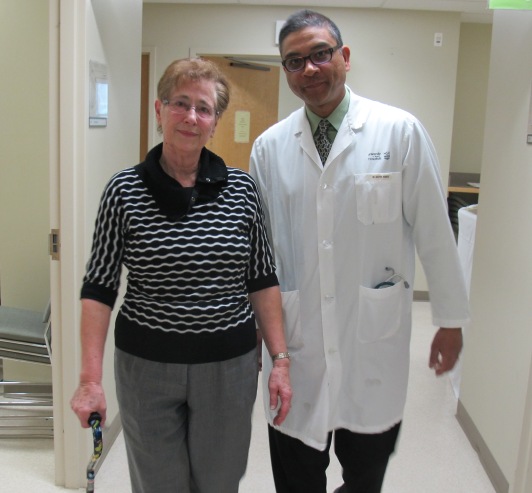
Dr. Saifee Rashiq, lead author of the study, with a patient who is recovering from a hip fracture
(Edmonton) Anesthesiologists now have more direction in their treatment of patients who have broken their hip and are undergoing surgery.
In the first study of its kind, researchers and physicians at the Faculty of Medicine & Dentistry have identified a type of nerve block that best serves patients who have broken their hip and require surgery.
Saifee Rashiq, with the Department of Anesthesiology & Pain Medicine, said that anaesthesiologists have long been freezing the nerves of patients just about to undergo surgery in an effort to improve their recovery. But there are many different types of nerve blocks that can be done and no literature backing which is best; that's why Rashiq along with Donna Dryden and Ben Vandermeer in the U of A Evidence-based Practice Center in the faculty decided to do what's called a network meta-analysis of previous studies on the subject to rank the best nerve block techniques.
"The concept is very simple, if I say 'A' is better than the standard of care by 10 and 'B' is better than standard of care by five then what's the comparison of 'A' and 'B'," explains Vandermeer about the network meta-analysis. "We can get all these treatments together and put them in order now from best to worst and approximate how much better each is compared to the others."
"This is important for doctors because some of these nerve blocks are easier to do than others and some are more reliable than others," said Rashiq. "Before you embark on something that's a bit more difficult and more time consuming you want to make sure it's actually going to make a difference. In the past people have speculated well maybe it's better not to bother doing these because it doesn't make any difference - well we've put that to rest."
Two techniques topped the list and both were relatively easy to perform. One reduced pain, but more importantly the other, which takes under two minutes to perform, reduced the chances of the patient getting delirium which can be very detrimental to the patient's progress and can sometimes even lead to death. Freezing the nerves prior to surgery decreases pain post-operation.
"One of the problems when you're in severe pain is that we have to load you up with drugs and that can cause delirium," said Rashiq. "Elderly sick people can't metabolize the drugs as well as younger healthy people, so the by-products of the drugs can cause that."
The group says more research needs to be done in the area, including head-to-head trials which compare the methods against each other. But for now, Rashiq says he wants his colleagues in the anaesthesiology community to start using one of the top two methods.
"If everybody used these techniques all the time you could make the business of having your hip fixed a lot less unpleasant," said Rashiq. "You could probably prevent a large number of people from having delirium and I'm sure that would save health care dollars."
The study, which is published in the Canadian Journal of Anesthesiology, was funded by the Agency for Health Care Research and Quality through their Evidence-based Practice Center Program.